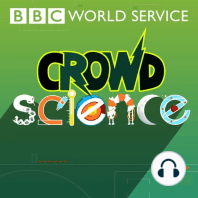32 min listen
How did humans discover medicine?
FromCrowdScience
ratings:
Length:
31 minutes
Released:
Feb 7, 2020
Format:
Podcast episode
Description
Today, once-fatal diseases like the plague, sepsis, or cholera can be treated simply and quickly with a pill. These tiny tablets hold compounds that can fix illnesses, and most people don’t think twice about taking an asparin for a headache.
Modern medicine looks nothing like the plants that many of them are derived from. But there must have been a moment, when the first humans decided that a particular plant, fungus, or mineral might cure them of an upset stomach, or infected wound. Right? That’s what listener Andrew Chen wondered, so he emailed CrowdScience to find answers.
Presenter Anand Jagatia speaks with an archaeologist, a botanist, an ethno-pharmacologist, a zoologist and a historian to uncover the story of early human experimentation with ‘drugs’ from plants, fungi, animals and minerals.
The history of humans is full of illness and poor health, and it seems we’ve always tried to fix this. Anand discovers the connection between food and medicine while making tonic water from scratch with Kim Walker at the Royal Botanic Gardens of Kew, and tastes the daisy-like Chinese herb that was first used thousands of years ago, and then – once tested - became one of the best modern drugs for treating the world’s most deadly infectious disease.
Listener Andrew’s inspiration came from a previous episode of CrowdScience ‘Who were the first farmers?’ and so we return to expert anthropologist Cheryl Makerewicz who tells us about the ecological knowledge of hunter-gatherers and pastoralist communities. With Jaap de Roode, Anand discovers that conscious thought isn’t a pre-requisite of medical discovery, and historian Vivienne Lo explains how written word helped to standardise generations of medical knowledge in East Asia. Previously medical knowledge had been irrevocably linked with shamanism, magic and spirituality, but with modern medicine this changed – but today there is still much we can learn from ancient forms of knowledge, Christophe Wiart explains how his science focuses of discovering what plants tribal people in east Asia have used for centuries to cure their ailments. These early methods may help us combat new diseases today.
Presented by Anand Jagatia
Produced by Rory Galloway
[Photo: Women using plant medicines. Credit: Getty Images]
Modern medicine looks nothing like the plants that many of them are derived from. But there must have been a moment, when the first humans decided that a particular plant, fungus, or mineral might cure them of an upset stomach, or infected wound. Right? That’s what listener Andrew Chen wondered, so he emailed CrowdScience to find answers.
Presenter Anand Jagatia speaks with an archaeologist, a botanist, an ethno-pharmacologist, a zoologist and a historian to uncover the story of early human experimentation with ‘drugs’ from plants, fungi, animals and minerals.
The history of humans is full of illness and poor health, and it seems we’ve always tried to fix this. Anand discovers the connection between food and medicine while making tonic water from scratch with Kim Walker at the Royal Botanic Gardens of Kew, and tastes the daisy-like Chinese herb that was first used thousands of years ago, and then – once tested - became one of the best modern drugs for treating the world’s most deadly infectious disease.
Listener Andrew’s inspiration came from a previous episode of CrowdScience ‘Who were the first farmers?’ and so we return to expert anthropologist Cheryl Makerewicz who tells us about the ecological knowledge of hunter-gatherers and pastoralist communities. With Jaap de Roode, Anand discovers that conscious thought isn’t a pre-requisite of medical discovery, and historian Vivienne Lo explains how written word helped to standardise generations of medical knowledge in East Asia. Previously medical knowledge had been irrevocably linked with shamanism, magic and spirituality, but with modern medicine this changed – but today there is still much we can learn from ancient forms of knowledge, Christophe Wiart explains how his science focuses of discovering what plants tribal people in east Asia have used for centuries to cure their ailments. These early methods may help us combat new diseases today.
Presented by Anand Jagatia
Produced by Rory Galloway
[Photo: Women using plant medicines. Credit: Getty Images]
Released:
Feb 7, 2020
Format:
Podcast episode
Titles in the series (100)
How Do You Stop a Hedgehog Invasion?: Getting rid of an invader that people think is cute poses all sorts of prickly problems… by CrowdScience
